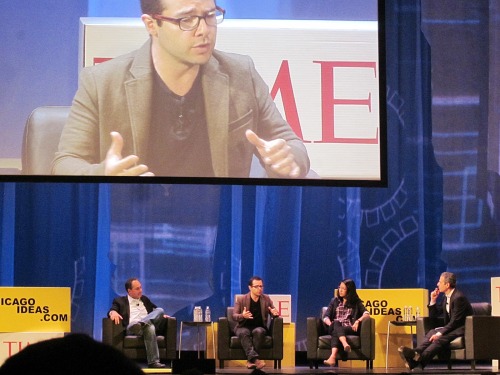If Benjamin Franklin were to return in the present day, the world would be an incomprehensibly different place – except in a few areas. For all the advancement humanity has seen in the centuries since Franklin, a celebrated disruptor himself, institutions such as education and politics look pretty much the same. Students still gather in classrooms watching teachers write on the blackboard and dutiful citizens still head to the polling booth to cast their vote.
Luckily, “a little disruption goes a long way,” as Aza Raskin asserted at Tuesday’s Disruptive Innovation: Reinventing Our World discussion. Having each launched startups in some of society’s least flexible fields, Raskin, Dan Rosenweig, and Elaine Chang imparted the challenging necessity of disruptive innovation for Chicago Ideas Week.
Politics
“The way we talk about human and political issues and set a national agenda is decided by a very small group of people,” said Chang. As the founder of Social Teeth, Chang aims to disrupt campaign status quo by crowdsourcing funding for independently-made political ads, PSAs, and works of art. By providing alternative viewpoints on social channels, Chang hopes Social Teeth will “empower individuals to do what super PAC’s do.”
The greatest challenge to Social Teeth’s disruption is the nature of the institution itself. “People are turned off by political ads,” Chang noted. So what’s the key to success in disrupting the political playing field? “Playing with expectations.”
Education
After serving as COO of Yahoo! and CEO of Guitar Hero, Dan Rosenweig is tackling education as the CEO of Chegg. Chegg disrupts the lucrative business of buying and selling textbooks by providing a platform to rent them instead. “Who the creators of products and services sell to has to be changed,” said Rosenweig. “We aim to utilize data to the advantage of the consumer, so the end customer is who they build for.”
During Tuesday’s discussion, Rosenweig related his impressions of visiting college campuses with his daughter, noting education’s rigid focus on preserving the past over continued innovation. “The best thing we can do for educators is educate them on technology.” By applying technology to the obstructions of education, Chegg aims to empower the individual over the institution.
Healthcare
A serial startup Renaissance man, Aza Raskin’s latest venture, Massive Health, combines his knack for integrating data insight and clean design with a quest for innovation in personal health. Massive Health’s website prompts: Why is it that we live surrounded by beautiful technology, but as soon as we get sick we’re left out in the cold? “Medicine doesn’t work the way people do, it works the way it always has,” Raskin argued. “While Google wants to know everything about you, the hospitals know nothing.”
Massive Health intends to help individuals take ownership of their health through a series of apps and other media, combatting what Raskin calls “trickle down medicine.” “Products are not made for the person; they’re made for insurance companies or doctors. We need to design for people.”
Raskin admits facing “empathy gaps” when designing to disrupt the management of other people’s healthcare for the better, but asserts that his mission, like all disruptive innovation, is born out of passion. Armed with passion, how does the process of disruptive innovation begin? According to Raskin,“Brilliant ideas are almost always obvious in hindsight.”
 Rosenweig, Raskin, Chang, and moderator Richard Stengel
Rosenweig, Raskin, Chang, and moderator Richard Stengel

Jessica Mlinaric founded Urban Explorer in 2010 to inspire curious travelers by highlighting history, culture, and hidden gems in Chicago and beyond. She is the author of ‘Secret Chicago’ and ‘Chicago Scavenger,’ and she has contributed to several travel guidebooks. Jessica has visited 20+ countries and 30+ U.S. states. She has more than 16 years of experience as a marketing strategist and works as a freelance writer and photographer.




